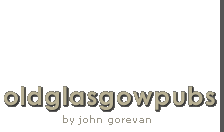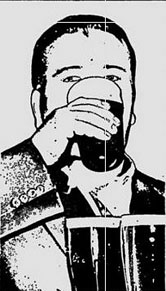What "Ales" us when it comes to beer.
In the NEWS 1975...
The SIGHS were deep. Heads were shaken, I was seized upon as a wait from out of the wilderness, a tankard of Marstons heavy duty Burton-on-Trent ale was thrust into my palsied paw, and the spokesman said, "Glasgow? You poor chap. What a bleak spot. Drink up, why, there are only about a dozen pubs there selling real beer. And the frightful thing is that the Scottish public have come to accept the other stuff. Drink up, and have another."
When I said that I had escaped from Glasgow a number of years ago to take advantage of the real stuff in England, there were smiles of approval and more Marstons all round.
My safari on this precious occasion had taken me to the "Cheshire Cheese," one of the great London drinking howffs, the place where Dr. Samuel Johnson once upon a time uttered his profundities to the clink of pewter, the gurgle of real ale and porter, and the scribbling of his randy biographer Boswell.
The Cheese still serves the traditional brew. But in general, you and I and John Englishman have come to inhabit a world of ersatz fizz where the big brewers (according to their many critics) have been killing off beer by flirtation and pasteurisation. The scene has gone quite tasteless.
DEMANDS
My invitation to The Cheese had come from a group called CAMRA who declare that the day of remotion has come. Down with the so-called "naturally conditioned beer", which is just another term for liquor "that doesn't taste anything like beer in the accepted sense."
CAMRA (Campaign For Real Ale) are demanding that the proper wallop, bugs and all, be made available on the widest possible scale and forthwith.
My spokesman friend informed me that in Britain there are 70,000 pubs of which only about a third offer the real thing. The rest "serve nothing but beers which have undergone unnatural processes, either in the brewery or after arriving at the pub."
What makes a beer real? "Simple, it's an ale brewed from malted barley and hops and fermented, by adding yeast. It is served from casks made of wood or metal (or any other hygienic substance for that matter) by any method which doesn't involved the artificial use of carbon dioxide gas."
In Glasgow you can go to the Firhill Tavern, along the Garscube Road, and buy for yourself a pint of the best Belhaven. The Auld Hoose in Main Street, Baillieston, will serve you Belhaven, too, And at the Rock Bar in Possil Road you can have draught McEwan for real.
Man, you're buying taste, Duncan McAra, an Edinburgh drinking type who has been researching into the whole drouthy business, told me, "The situation in Scotland is very bad. The Scots are being taken over by the English. Since the last war 20 old-established breweries in Scotland have stopped operating or been taken over. And the West of Scotland is particularly deprived."
I put it to Duncan that if Scottish folk weren't kicking up a fuss about their beer they were probably quite satisfied with it, but he wouldn't accept that. "The trouble is that a lot of people, especially young folk. Up there think that if a beer isn't in a bottle it's a draught beer. They don't know the difference between real draught and beer, so they have no idea what the gist of their complaint should be.
NOT RIGHT
"For us in CAMRA the difference lies in one big important factor, taste. The big breweries are trying to sell Scotland the idea of a national beer from pressurised casks. This is just not right at all. "We want more local beers from fonts, beers you can taste, beers that have an after-taste as well, that is, the kind of taste that hits the back of the tongue and throat."
Glasgow, Edinburgh and Dundee now have branches of CAMRA, which claims a general British membership of 10,000. And I understand that a comprehensive booklet on real draught beer in Scotland is projected to help the taste buds.
For the present there's a small Scottish section listed in the new CAMRA "Good Beer Guide," priced 75p which lists 2700 British pubs.
End.

